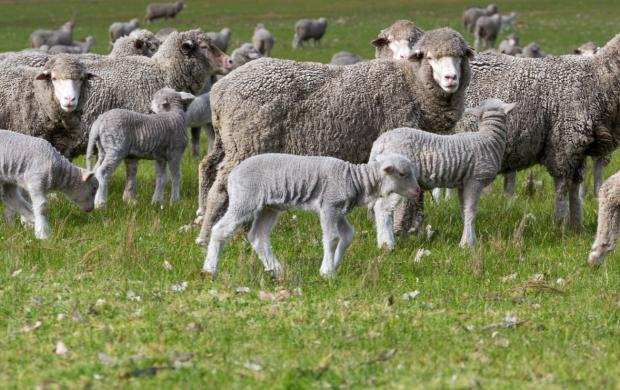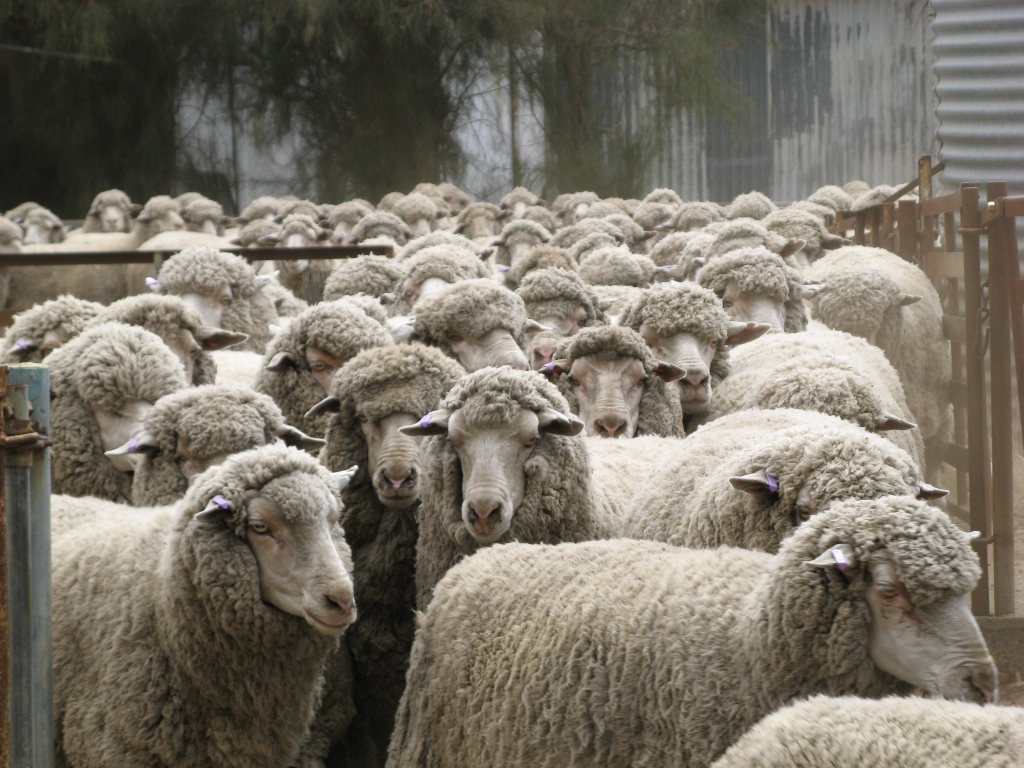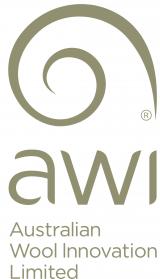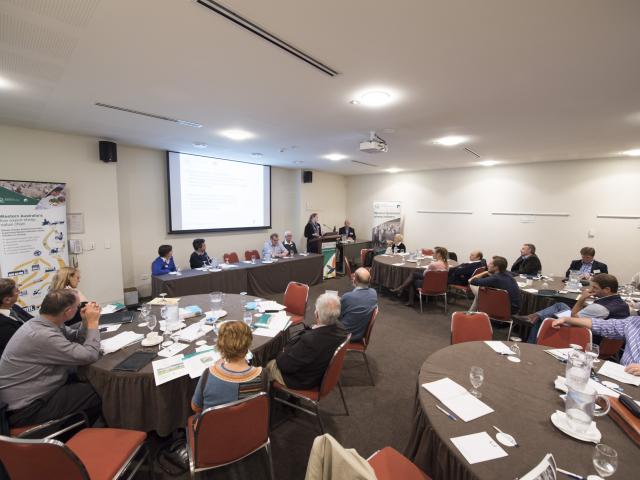Welcome

Welcome to the Sheep Industry Business Innovation (SIBI) project newsletter!
In this edition, read about...
- the industry’s new peak body, the Sheep Alliance, its board of directors and important vision and mission
- Sheep meat value chain training course, an excellent opportunity for university students and young professionals
- how groups can join the Lifetime Ewe Management (LTEM) training course
- the very successful recently-held events SIBI Unplugged and Agribusiness Sheep Updates – and why are they trending in social media
- SIBI staff member Meghan Cornelius and her Bred Well Fed Well workshops
And in global news … WA meat processor V&V Walsh has officially opened its largest processing facility in Inner Mongolia in September. A joint venture with Grand Farm, China's biggest importer of red meat from Australia and New Zealand, the abattoir is the largest in the region, with a capacity to process about 10,000 lambs and 1000 cattle a day. Congratulations to SIBI’s very own Terry Burnage who worked hard in the red meat trade to make this possible. Read the full story here.
The Department of Agriculture and Food, Western Australia (DAFWA) is proudly supporting the sheep industry to capitalise on growing markets for sheep products and to be internationally competitive and grow in value in to the future. The SIBI project will assist the industry to build capacity to supply new markets for sheep meat and live exports, particularly in nearby Asia and the Middle East – generating flow-on benefits to producers, industry, the regions, communities and the state economy. Our priorities are to transform the sheep supply chain to develop customer focused products for target markets and to support the increased turn off of quality lamb and sheep meat from a sustainable production base.
For more information on the project please visit our Sheep Industry Business Innovation webpage.
If you have any suggested articles or how we can improve this newsletter we’d love to hear from you at sibi@agric.wa.gov.au.
The Sheep Alliance of WA is set to lead the industry
In July 2016, the Sheep Alliance replaced the original Sheep Industry Leadership Council (SILC) formed by the WA State Government in 2011.
A broad industry consultative process was undertaken in early 2016 to review the strategic plan and develop the suite of activities that will be undertaken to deliver on it. The review highlighted the need for greater ownership and accountability to meat processors, wool and livestock exporters and grower groups, and prompted a process of re-vamping SILC so that it might become more representative of the entire WA sheep supply chain.
The SILC board adopted a new constitution including name change to the Sheep Alliance of Western Australia, membership and accountability structure and mounted a fresh call for directors in order to broaden the reach and influence of the board. Its operation is supported by Royalties for Regions through the Sheep Industry Business Innovation project.
The directors unanimously endorsed the selection of WAMMCO chairman and Kojonup producer Craig Heggaton to be the alliance’s chairman and appoint Pingelly producer and veterinarian Tim Watts as the vice-chairman.
The new board of the Sheep Alliance of WA agreed at their first meeting to progress the issues tabled by its 40-plus members at its first members forum, and the directors identified two key immediate tasks they would tackle: to drive profitability and arrest the decline in sheep numbers.
At the top of the alliance’s agenda was the job of preparing a business case for investment in sheep research, extension and communication across the supply chain and responding to a strong directive from the membership base to formulate a model for effective sheep R&D in WA.
The Sheep Alliance website is coming soon. For more details on the board and terms of reference, please visit DAFWA's webpage on the Sheep Alliance.
Applications are now open for the Sheep meat value chain training program

In a direct endeavour to increase professional capacity, the ‘Dedicated Value Chains’ component of the SIBI project has established a program of innovative training activities.
The intention of these activities is to create industry learning experiences for employees, professionals, undergraduates and recent graduates.
An initial five day training course was run over two weeks for DAFWA staff involved with the beef and sheep sectors, with some representatives from the industry that allowed participants to get an in depth understanding and experience of the intricacies of the sheep meat supply chain from paddock to plate. Participants walked the chain at a processor, spoke to growers and visited Farmer Jack’s to get the ‘real time’ experience.
Also in partnership with Murdoch University, a one-day teaching program covering introductory subject material on agrifood value and supply chains will be delivered to 3rd year Animal Science undergraduate students in November 2016. It will have a particular emphasis on the sheep meat industry of WA and become a key unit in the curriculum. The course will be offered to all WA universities with similar disciplines over the next year.
Building on the program, an intensive training course has been developed for undergraduates and recent graduates with a genuine interest in the industry. This will be offered as a free five-day residential course in the week leading up to Australia Day 2017. Successful applicants will get the unique ‘walk-the-chain’ experience, as well as to network and share ideas with senior industry practitioners.
SIBI is also planing to offer a similar version to individuals already working in key roles within the WA sheep industry who are looking to broaden their knowledge and gain skills in the sheep meat value chain.
Applications are now open! For more information visit the Sheep meat value chain training course webpage or contact SIBI’s Justin Hardy at justin.hardy@agric.wa.gov.au or call +61 (0)8 9892 8408.
Lifetime Ewe Management training course open for groups

Lifetime Ewe Management (LTEM) is an exciting and highly regarded training course for producers to learn or improve their skills and knowledge in increasing lambing percentage and lamb survival.
Course Outline
Lifetime Ewe Management (LTEM) is a nationally accredited course involving groups of 5-6 producers and six 'hands-on' sessions over a period of 12-18 months. Training under the Lifetime Ewe Management program equips participants with best practice management principles for ewe management to increase on-farm productivity and profitability.
The timing of each meeting is linked to critical stages in the management of the ewe’s reproductive cycle. All sessions involve a visit to each participant’s farm and focusses on condition scoring, pasture assessments and feed budgeting activities that are practical and applicable to the farm business.
Each producer monitors a mob of their own ewes to demonstrate the effects of nutrition and management in their environment.
The program also focusses on improving producer understanding of the influences that nutrition has on the performance of the ewe and her progeny.
Key topics covered in the course
- The principles and practices of LTEM
- Weaning and preparing ewes for next year's joining
- Linking ewe condition at joining with lambing potential
- Pregnancy management and the impacts of ewe nutrition
- Looking forward and planning for lambing — optimising lamb survival and future productivity
- Potential reproductive rate and the impacts of ewe nutrition in late pregnancy
- Setting up for joining in the second season — manipulating ewe condition and preparing rams
- Economic analysis of different feeding strategies
How much will it cost?
The training course is subsidised by AWI. Each participant pays $865. This covers all the six sessions which are run over 12-18 months.
AWI provides a $400 recruitment fee once the group has been fully enrolled.
The Sheep Industry Business Innovation (SIBI) Royalties for Regions project will provide extra financial assistance to corporate farms (with employees committed to undertaking the course) and large producers (>8000 ewes) in some circumstances.
Getting started
Get a group together - a minimum of 5 participants, preferably within 50km of each other and happy to work together. Contact Steve Tunbridge for more details on registering your group and choosing a trainer. Groups who are struggling to have five participants should also contact Steve to discuss options for establishing a group.
Steve Tunbridge
DAFWA, Katanning
+61 (0)439 512 853
Stephen.tunbridge@agric.wa.gov.au
Kirsty Kennedy
Program Development Coordinator RIST
+61 (0)3 5573 0990
SIBI Unplugged: the project has come to its midterm review
As part of a wider industry engagement process and the contracted activity for the Sheep Alliance of WA to provide feedback and guidance on the SIBI project, SIBI Unplugged was run on 29 August 2016 and was the first specific presentation to the wider WA sheep industry to communicate the objectives and progress against outcomes mid-way into the project.
Twenty industry members and 17 DAFWA staff, 15 of which were SIBI staff participated at the event, held at UWA Club in Perth.
The first part of the forum highlighted in snapshot form the role of the project, current strategies for achieving the outcomes and a brief from each sub-project manager on their area. Three exciting opportunities were also presented; chilled meat licence into China, the Lamb Survival Initiative and the new sensor project – Fitbits for sheep.
The last half of the program was designed so that participants had opportunities to give feedback and discuss the future direction of the project for each of these four work areas;
- Increased lamb and sheep turnoff
- Increased confidence and capacity of industry to respond to market demand
- New value chains
- Better communication between customer, producer and industry
The audience discussed the questions; ‘What's working?’ and ‘What are the new opportunities?’
For ‘Increased lamb and sheep turnoff’ the groups identified
- NEED : better attention to lamb marking rates
- NEED: focus on multiple scanning
- NEED: to do more to get groups engaged in LTEM
For ‘Increased confidence and capacity of industry to respond to market demand’ the groups identified
- NEED: Increase and change the skill set of agents and buyers to support the industry better
- NEED : More predictive market information service that gives producers an opportunity to plan
- NEED: More communication to producers on the opportunities of new markets
- NEED: More focus on risk and the value of off-setting risk with sheep.
- NEED: better understanding about why producers aren’t investing in sheep.
For ‘New value chains’ the group identified
The supply chain is working but the value chain is not. There are many vested interests which is disruptive to the continuity of supply.
- NEED: systematic approach to supply and logistics – help the way forward.
- NEED: a fundamental shift to make it happen.
For ‘Better communication between customer, producer and industry’ the groups identified
There is shared concern over the decline and everyone sees it as an issue that needs to be addressed.
- NEED: Total engagement of the industry sector
- NEED: Sheep Alliance to be seen as providing leadership across the whole chain so it can all be talked about.
The meeting gave SIBI a much better idea of the areas of interest of the participants and where they saw important gaps in our knowledge or focus. The project will use a range of methods including social media to communicate the work that it does and to gather feedback from industry over the next 12 months.
Trending n-ewes: Agribusiness Sheep Updates 2016
The 2016 Agribusiness Sheep Updates “Sharpening the Sheep Business”, held on Tuesday 30 August at the University Club of Western Australia, attracted 114 industry leaders.
Speakers at this year’s event included several high profile professionals, addressing topics focussed on 'Sharpening the Sheep Business'. The program aimed to provide industry with business development ideas for the WA sheep industry.
Sessions included:
industry level presentations -
- Predictions for the sheep industry: Mick Keogh, Chairman of the National Rural Advisory Council, and Member of the CSIRO Sustainable Agriculture Flagship Advisory Committee and Executive Director, Australian Farm Institute
- Managing risk through investment diversification: David Cornish, Cornish Consulting
- How to efficiently transition from a family farming business to a diversified agricultural business: Michael Chilvers, 2012 Nuffield Scholarship winner, Tasmania
- Advisory Boards in Agriculture: Danielle England, AgInnovate and Gerri Hinckley, Tincurrin
- Planning for Success: Rosemary Bartle, Rabobank
In-depth system analysis -
- Seasonality of lamb supply- have we interpreted the price signals correctly? John Young, Farming System Advisory Service
- Comparative profitability of sheep versus cropping: Ashley Herbert, Agrarian
- Economics of getting back into sheep: Alana Starkie and Paul Omodei, Planfarm
Examples from industry -
- Building industry – building relationships (Tri-Lamb Alliance): Jamie Heinrich, Kangaroo Island
- The Dorper Lamb Story: Graeme Howie
- Successful Supply Chains: David Lock, Managing Director, Mareterram Limited Australia
Feedback showed that attendees enjoyed the day, with many comments about the quality of speakers and flow of the program.
“It was a very well run event, and the balance of presentations and order of them excellent. Thank you”, “Thank you for an informative day - the sections were well thought out and while different linked well.”, “Good coverage of topics, communication. Opportunities to come, we just need to embrace the rest of the industry.”
The early afternoon session presenting SIBI commissioned analyses was well received. The comments indicated there was a general desire for more research, practical application of technology, and industry innovation.
The event trended in social media. As per DAFWA corporate communications, the Twitter stats from the recent Sheep updates were the best DAFWA has ever seen from an individual event.
The SIBI team thanks the industry fo their support and are happy that the Agribusiness Sheep Updates remains a ‘flagship event’ for the WA Sheep Industry.
For copies of the presentations, visit Agribusiness Sheep Updates 2016 webpage.
Using sheep genetics and nutrition to boost sheep production
Bred Well Fed Well workshops, funded by Meat and Livestock Australia, are a great opportunity for sheep producers to understand how genetic information, balanced with the right ewe feed management; can be applied to their business to create better results.
Like anything in today’s society, modern science can help take the guesswork out of important decision-making. For sheep producers the information in these workshops is invaluable in developing breeding objectives and feeding programs to get the best out of a flock.
Sheep farmers can learn how to combine the science of genetics and ewe nutrition to boost reproduction rates and productivity.
Bred Well Fed Well workshops delve into understanding the importance of Australian Sheep Breeding Values (ASBVs) — which is an estimate of the genetic potential a sheep will pass on to its progeny — and how, when used along with visual assessment, they can assist producers in buying the right genes for their sheep business to improve production and profit.
DAFWA sheep genetics development officer Meghan Cornelius said the workshop aimed to provide scientific data and tools in a forum where it could then be given a practical application. The workshops included practical sessions on condition scoring, feed budgeting, ram rankings and ram selection.
The workshops focus on how to use those breeding tools to enhance the overall profitability of a sheep farm and how farmers can develop a breeding objective for their particular flock.
Bred Well Fed Well workshops already held this year were:
- Bred Well Fed Well - 27 July 2016, Woodanilling
- Bred Well Fed Well - 28 July 2016, Hyden
- Bred Well Fed Well - 2 August 2016, Dandaragan
- Bred Well Fed Well - 3 August 2016, Northampton
For more information visit the sheep breeding and selection workshop webpage.
To participate contact Meghan Cornelius on +61 (0)8 9821 3250 or email meghan.cornelius@agric.wa.gov.au
SIBI staff profile: Meghan Cornelius
Meghan grew up on a farm in Arthur River for her first five years and despite the sale of the farm and moving to Perth for the following ten years she never lost touch with the country and her farming background. Meghan’s fondest memories were spending school holidays back in Arthur River at the neighbour’s farm or in Albany at her grandparent’s farm.
It was this background and love of farming that led Meghan to enrol at Cunderdin Agricultural College for her final high school years (2002-2003), where she developed a strong interest in the WA sheep industry. Not knowing what she wanted to do after leaving school, Meghan took the year off and worked as a farm hand on a commercial sheep, cattle and cropping property in Dandaragan. At the end of that year she knew she wanted to further her education in the agricultural industry.
After completing a Bachelor of Agribusiness (Agricultural Technology) from Curtin University’s Muresk Institute in 2008, she worked for the private research company Agrisearch Services. She conducted sheep health trials focusing on testing new fly, lice and worm products for different companies.
Her time at Agrisearch sparked a great interest in research, which led to Meghan receiving a Sheep CRC scholarship in 2010 to complete a PhD in Veterinary Science with Murdoch University. Her PhD looked at alternative worm control strategies in sheep, specifically the concept of targeting drenches to the sheep that would benefit from treatment rather than the whole flock at one time. The purpose is to delay the development of drench resistance. This concept, known as Targeted Selective Treatment, is not new, however two key issues have delayed its adoption by industry; 1) the lack of an effective and practical method for identifying which sheep need drenching, and 2) the risk that some sheep will be left with worm burdens large enough to compromise production and welfare.
“My research investigated body condition score of sheep to see if it could be used as an indicator to determine a sheep’s ability to handle worms and therefore remain untreated, while also looking at the trade-offs between delaying drench resistance and potential production losses and welfare issues.”
The findings from this research can provide recommendations for the sheep industry regarding sustainable worm management strategies and can aid in the adoption of Targeted Selective Treatment.
Meghan is currently based in Katanning as a Development Officer for the livestock industry, working to increase the adoption of genetic technologies by Western Australian sheep breeders and producers. She is focused on increasing the use of Australian Sheep Breeding Values (ASBVs) by ram breeders in their stud flocks and by ram buyers for their ram selections.
“I help coordinate the delivery of workshops that aim to increase producer confidence in choosing rams for purchase using ASBVs”.
“I strongly encourage every sheep producer to attend a RamSelect or Bred Well Fed Well workshop to help define their breeding objectives, and understand how to effectively use ASBVs.”
“ASBVs are a scientifically and commercially proven tool that can increase genetic gain and help you achieve your breeding goals.”
Meghan is also available to run ‘RamPower’ analyses for farmers interested in benchmarking certain flocks. The RamPower program (from Sheep Genetics) generates ‘within flock’ indexes for enhancing breeding selection decisions based on weight, carcase and fleece measurements.
Meghan enjoys working closely with the Sheep CRC and Sheep Genetics to keep up to date with the latest developments in ASBVs and related technologies. It is a very exciting area, and by increasing the adoption of these genetic technologies, the industry’s rate of genetic gain will increase and we can work towards doubling the value of the sheep industry by 2025.
Away from DAFWA and farming, Meghan’s interests include animal handling (livestock, horses and dogs), music, dancing and settling down to a good TV program.



